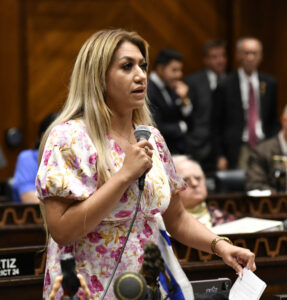Key Points:
-
The bill would outlaw encampments on university and community college campuses
-
Opponents fear the bill could violate First Amendment rights and lead to arbitrary enforcement
-
The measure goes beyond existing state law that allows universities and community colleges to regulate protests
The Legislature approved a bill on April 30 that would ban overnight encampments on university and community college campuses, and require university and college presidents to enforce the law.
House Bill 2880 passed the Senate with some bipartisan support despite concerns from Democrats that the bill would threaten free speech on campuses and allow protestors to be detained for expressing their First Amendment rights.
Although the bill was sponsored by Democrat Rep. Alma Hernandez, D-Tucson, and received approval from three Senate Democrats, the measure received heavy criticism from other lawmakers on that side of the aisle.
Senators Eva Diaz, Sally Ann Gonzales and Kiana Sears voted for the bill while Sen. Jake Hoffman was the only Republican who opposed the legislation.
Hernandez previously said she introduced the bill in response to the pro-Palestinian and anti-Israel protests last year and described Jewish students facing harassment while on campus.
Democrats who opposed the bill pointed to examples of pro-Palestine protestors across the country receiving harassment, including those who’ve had their visas revoked for participating in protests.
Sen. Analise Ortiz, D-Phoenix, told the story of Noor Abdalla and her husband Mahmoud Khalil, a Columbia University graduate student and Palestinian activist who was arrested by federal immigration authorities.
Ortiz said these types of laws criminalize protests and put a “target on the backs of people simply for their political beliefs.”
“This law is based on the unfounded idea that protests and protesters make us less safe,” she said. “Ironically, it’s laws like this that actually diminish safety and stability in our communities as our most sacred right to express ourselves, our right to assembly, our right to petition the government for redress of grievances are trampled upon.”
Current state laws allow for students and faculty to protest “within the limits of reasonable viewpoint and content-neutral restrictions on time, place and manner of expression.” Campus protestors also are not allowed to engage in “unlawful” activities and disrupt the functioning of a university and college.
However, the bill directs university and community college presidents to immediately call for the dismantling of any encampments and call law enforcement if protestors don’t comply. A failure to comply could lead to a criminal trespass charge.
Ortiz criticized the vagueness of the bill, saying it could potentially lead to arbitrary enforcement.
“The language is so vague that it can and will be interpreted as such, and law enforcement will have no discretion, no choice but to enforce an unconstitutional law,” she said.
Sen. Lauren Kuby, D-Tempe, said the bill is unnecessary and represents political overreach that could endanger the rights of campus students.
“Students will be chilled to take action. This isn’t about public safety. It’s about state sanctioned harm,” Kuby said.
Supporters of the bill backed up Hernandez’s assertion that the legislation was needed to protect Jewish students during what they viewed as a time of increased antisemitism.
“Can you imagine if encampments were set up on college campuses here by the KKK in their hooded robes and masks covering their faces, calling for the death of African Americans, not allowing them to go to their classes, harassing and threatening them and, in some cases, physically assaulting them,” said Sen. Hildy Angius, R-Bullhead City. “Would you defend their First Amendment rights? Do you think this state and this country would let that go on? Of course not, and I would bet everyone in this room would be doing whatever they could do to end it.”





























